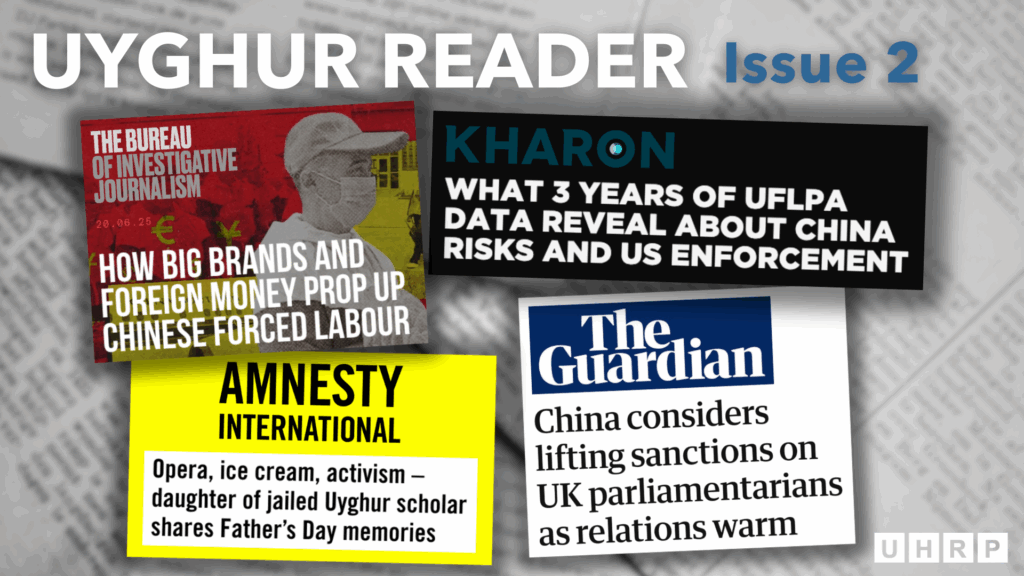The Uyghur Reader: Stories We’re Following (Issue 2)

Issue 2: June 12 – June 25, 2025
Welcome back to The Uyghur Reader, a biweekly content roundup curated by the staff of the Uyghur Human Rights Project.
Each issue features carefully selected articles, reports, and publications from media outlets, academic institutions, NGOs, and government sources. While we highlight urgent human rights issues, we also aim to reflect the breadth of the Uyghur experience, including politics, economics, history, and culture. Our goal is to provide a trusted resource for understanding the complexities and realities facing Uyghurs today.
This week’s selections are from Director of Research Henryk Szadziewski and Associate Director for Research and Advocacy Peter Irwin.
📌 On June 20, The Bureau of Investigative Journalism (TBIJ) published a report by Daniel Murphy revealing how South Korean electronics company, LG, directly owns and operates two factories that have received Uyghurs through China’s labor transfer scheme outside the Uyghur Region, amounting to forced labor. The report, “How Big Brands and Foreign Money Prop Up Chinese Forced Labour,” draws on thousands of Douyin videos to document state-imposed labor transfers from the Uyghur Region to factories across China, identifying factories linked to brands such as Apple, LG, Skechers, Midea, and Volkswagen. The report follows a larger joint investigation from late May with The New York Times and Der Spiegel into state-imposed labor transfers outside the Uyghur Region and their integration into global supply chains.
📌 In an investigation published by The Jamestown Foundation on June 19, “Xinjiang Security Expo Reflects the Limits of U.S. Sanctions,” Jonah Reisboard reveals how the annual Central Asia Digital Security Expo in Xinjiang, backed by the U.S.-sanctioned Xinjiang Public Security Bureau, continues to draw tech firms marketing products that support the Chinese government’s surveillance and repression campaign. Despite U.S. sanctions and compliance measures, the report finds that nearly one-third of expo participants maintain international ties, especially to the United States, through customers, branches, trade shows, or regulatory approvals.
📌 On June 18, Kharon, a global risk analytics platform, published an analysis of the effects of the Uyghur Forced Labor Prevention Act (UFLPA), three years after implementation. The analysis, “What 3 Years of UFLPA Data Reveal About China Risks and US Enforcement,” highlights the significant impact of UFLPA enforcement since 2022, with the U.S. Department of Homeland Security listing 144 entities suspected of ties to forced labor from the Uyghur Region, as of January 2025, and U.S. Customs and Border Protection (CBP) seizing billions of dollars’ worth of products including cotton, electronics, and auto parts. The analysis shows that 60% of companies on the UFLPA Entity List operate outside the Uyghur Region, with extensive subsidiary and customer networks, illustrating the widespread and evolving nature of forced labor risks in global supply chains.
📌 On June 15, Eleni Courea for The Guardian reported that China is considering lifting sanctions it imposed in 2021 on UK parliamentarians who spoke out against human rights abuses in the Uyghur Region. Among those sanctioned were five MPs (Iain Duncan Smith, Tom Tugendhat, Nusrat Ghani, Neil O’Brien, and Tim Loughton), two peers (David Alton and Helena Kennedy), as well as Newcastle academic Jo Smith Finley, and Geoffrey Nice KC, chair of the Uyghur Tribunal. The move comes amid signs of warming diplomatic ties, including recent high-level visits to the UK by Chinese officials. The UK government has reportedly ruled out lifting its own sanctions on Chinese officials.
📌 On June 13, Amnesty International published a personal reflection by Jewher Ilham, “Opera, ice cream, activism – daughter of jailed Uyghur scholar shares Father’s Day memories,” marking Father’s Day without her father, Ilham Tohti, the imprisoned Uyghur scholar serving a life sentence in China on baseless charges. Jewher shares memories of their life together, including singing opera in their apartment hallway, his love of Uyghur food, and his unwavering generosity and courage. She recounts their last moments together in 2013 before he was barred from leaving China and emphasizes how her father’s advocacy shaped her own. The piece calls on the global public to keep up pressure for his release, stressing that even small actions, like writing letters, can have significant impact. Read the Chinese version.
Keep Reading:
- Laura Walters, Newsroom, June 17: ‘If not now, when?’ – Uyghur woman asks PM to help get her brother back
- Scilla Alecci, International Consortium of Investigative Journalists, June 23: China uses dissidents-turned-spies to infiltrate overseas activist groups, as authorities flounder
- Laura Walters, Newsroom, June 25: NZ officials travel to Xinjiang to raise concern over Uyghurs
